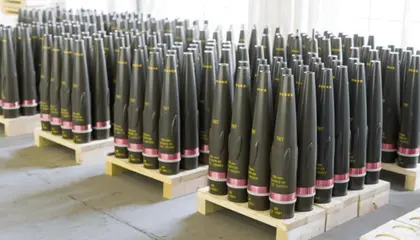Monday was a mixed day for Ukraine on the weapons front, with some good news about artillery but some mixed statements from world leaders on the possibility of Kyiv receiving fighter jets to help fight back against Russia’s full-scale invasion.
JOIN US ON TELEGRAM
Follow our coverage of the war on the @Kyivpost_official.
Let’s start with the good news
There was a positive development regarding artillery, with France and Australia announcing a deal to jointly produce 155 mm artillery shells for Ukraine.
For all the talk of heavy tanks, fighter jets and other advanced weapons systems, on the ground along the front lines, the fighting between Ukrainian and Russian forces is in large part a battle of artillery.
Russia has far more shells available, but Ukraine is far more accurate with the limited stocks it has and its units are generally much better trained.
"Several thousand 155 mm shells will be manufactured jointly," French Defense Minister Sebastien Lecornu said at a joint press conference with his Australian counterpart Richard Marles, as well as the countries' foreign ministers.
"There are some unique capabilities that exist in Australia and some synergies that can be achieved by Australia and France working together in relation to the supply of this ammunition," Marles said.
The deal will see both countries share the cost of the deliveries of ammunition from French manufacturer Nexter, with Australia to provide the explosive powder, Lecornu added.

Ukrainians Repel Russians in East, Destroy $77M in Weaponry as Glide Bombs Target Kharkiv Region
Is the deal a game-changer?
Almost certainly not – at the height of the artillery duels last year, both sides were firing “several thousand” shells each day.
Perhaps more importantly for France and Australia, the deal signifies a political reproachment of sorts after the 2021 row that saw Australia abandon diesel-powered French submarines in favor of nuclear-powered ones from the U.S. and Britain.
OK, were there any other positive developments?
There were further public statements from world leaders on the possibility of sending Ukraine F-16 fighter jets which Kyiv says are needed, alongside long-range missiles, to help fend off an expected offensive from Russia in the coming weeks.
French President Emmanuel Macron said on Monday he would not rule out the delivery of fighter planes to Ukraine but warned against the risk of escalation in the conflict.
“Nothing is excluded in principle,” Macron said after talks with Dutch Prime Minister Mark Rutte when asked about the possibility of sending jets.
But Macron set out a series of “criteria” before making any decision, as Ukraine steps up calls for more advanced weapons from the West just days after its allies pledged to deliver tanks.
These included that Ukraine must first make the request, that any arms would “not be escalatory” and that they would “not be likely to hit Russian soil but purely to aid the resistance effort,” AFP reports.
Macron added that any arms delivery “must not weaken the capacity of the French armed forces.”
The French president added that the Ukrainians “are not making this request at the moment for fighter jets.”
Have any other countries seemed open to the idea?
Dutch politicians have recently floated the idea of sending F-16 jets to Ukraine, but Rutte echoed Macron's cautious comments.
“There is no taboo, but it would be a big step,” said the Dutch premier. “It is not at all a question of F-16 – there has been no demand (from Ukraine).”
That sounds positive?
It does, but then we come to the bad news from yesterday.
The big boy of international relations and weapons supply – the U.S. – has ruled it out.
President Joe Biden simply said “no” when asked by reporters at the White House if he was in favor of sending fighter jets to Kyiv.
And all of the comments come a day after German Chancellor Olaf Scholz also said he would not send fighter jets to Ukraine.
You can also highlight the text and press Ctrl + Enter






